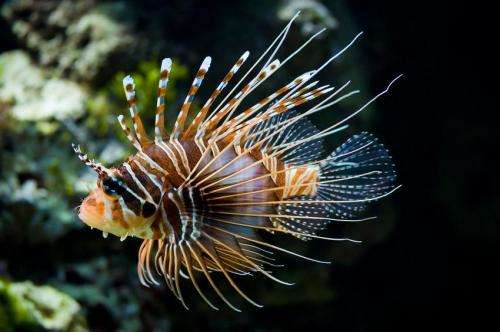July 24, 2014 report
Marine biologist claims lionfish study by sixth grader was lifted from his research

Zack Jud, a PhD graduate of Florida International University and current marine biologist, has caused a small ruckus in the marine biology community by posting comments on his Facebook Page, suggesting that the work done by thirteen year old Lauren Arrington was actually based on work he'd already done. Arrington, a sixth grade student in Jupiter Florida, and daughter of a professional biologist gained Internet notoriety this past week after news of experiments she conducted on lionfish went viral. Her experiments, which were used as a project in a science fair, demonstrated that lionfish can live in less saline water than had been previously thought. Jud contends that Arrington's experiments were based on his work, and that he should be getting the credit for the results.
Adding to the story was reporting by several news outlets that described Arrington's research as providing evidence of the invasive lionfish living in Florida estuaries. Both Arrington and her father have denied she ever made such a claim. Instead, they say, her research showed that lionfish could live farther upstream in an estuary than others had known about. Complicating things is news that prior to the science fair project, Arrington, her father and Jud were all friends. The father, Albrey, was even listed as a writer on a paper that listed Jud as the lead. Albrey was also, according to Jud, the best friend of Jud's supervisor when he was still in grad school.
Jud's complaint appears to center around the attention Arrington has received by the press—the accolades heaped on Arrington, he claims, should have been shared with him and his name should have appeared alongside hers in news reports. It was his original research after all, he contends, that led to the research done by Arrington. Jud also insinuates that the omission of his name in news stories was intentional, a move by the Arrington's to focus the attention on Lauren. The Arrington's have denied any such attempts and insist that mentions of Jud by either of them to the press were ignored in favor of a more popular storyline.
Some in the science community have sided with Jud, apologizing for publishing stories about Arrington's work without mention of Jud's previous work—others have looked to discredit Jud, by suggesting that Arrington should have been credited on some of his earlier work as she helped him with some projects when he was still in grad school.
At this point it seems clear that the story became perhaps, a little bigger than it should have due to the age of Ms. Arrington and the cuteness of her school science project, leading to a lapse in editorial judgment by some members of the press, unfounded claims in some instances and hurt feelings by one marine biologist.
© 2014 Phys.org




















